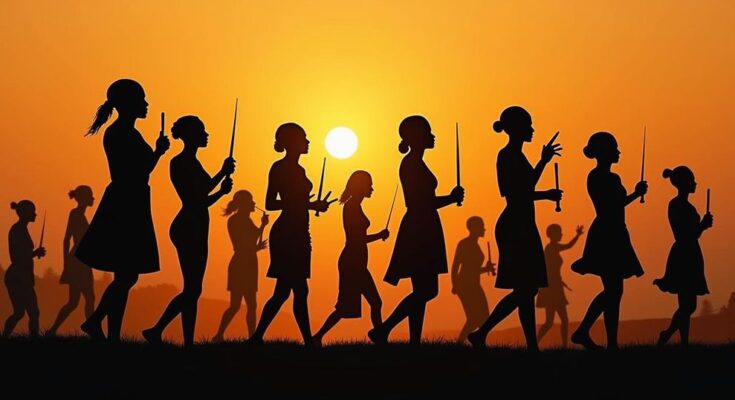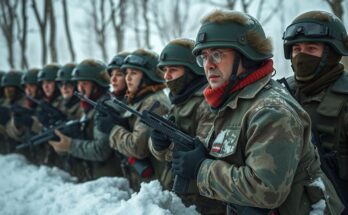Sudanese women, known as “Kendake,” have taken a leading role in fighting sexual violence in their country following the 2019 revolution. The recent conflict has seen a surge in atrocities against women, particularly in Darfur. Activists are mobilizing to provide support for victims, document abuses, and push for political representation. Initiatives include demands for humanitarian aid allocation towards women’s needs and strategies to protect women from violence during wartime.
In Sudan, the ongoing conflict has escalated concerns surrounding sexual violence against women, with particularly dire implications in the region of Darfur. Following the Sudanese Revolution, which culminated in the ousting of former President Omar al-Bashir in April 2019, Sudanese women, known as “Kendake” or “Nubian Queens,” have increasingly mobilized to combat wartime sexual violence. This term, rooted in the ancient Kush civilization, reflects their resilience and active role in the nation’s political landscape amidst the recent violence that erupted in April 2023, as military factions clashed in Khartoum, resulting in a humanitarian crisis marked by over 12,000 fatalities and nearly 7 million displaced persons. The United Nations has reported alarming rates of violence against women in the conflict, particularly in Darfur, which has a history of genocidal acts. These Sudanese women are not only victims but also advocates and political activists who fight against the injustices they endure, aiming to provide support for survivors and those escaping the destructiveness of war. Intisar al-Sadiq, an advisor to the peacebuilding organization Search For Common Ground Sudan, emphasized that women are ambitiously striving for peace, stating, “Women are now working intensively to stop the war and push the army and the rapid forces to a comprehensive peace.” In order to address the situation, various feminist groups have united to demand the allocation of humanitarian aid specifically for women in conflict zones. Their initiatives began in earnest in October, culminating in a conference in Uganda where they devised strategies for protecting women from sexual violence and establishing safe corridors for the vulnerable. The plans include a focus on documenting human rights violations and urging that 25% of humanitarian aid be designated for women’s projects. Reports submitted by the Sudanese Together Against Rape and Sexual Violence Campaign and the Unit for Combating Violence against Women and Children illustrate the severity of sexual violence in the conflict, calling out the military and Rapid Support Forces for their complicity in these crimes. Despite their activism, women remain underrepresented in political dialogues aimed at ceasing hostilities. As Sudanese activists continue their efforts to highlight violations and pursue peace, they remain dedicated to supporting victims and striving to form a roadmap for a peaceful future, defined by the contributions of women in restoring stability to their country.
The ongoing conflict in Sudan has led to widespread violence against women, with sexual violence particularly prevalent in the conflict-prone areas of Darfur. The historical context of this violence is tied to the genocide that occurred in the 2000s. Following the Sudanese Revolution in 2019, women in Sudan have become increasingly active in political movements aimed at addressing these atrocities and advocating for human rights. The recent outbreak of violence in April 2023 has exacerbated the challenges faced by these activists, who are now at the forefront of efforts to combat wartime sexual violence, provide humanitarian aid, and demand political representation.
The struggle for Sudanese women against sexual violence as a weapon of war highlights their critical role in the country’s political landscape. Despite facing immense challenges, including underrepresentation and worsening humanitarian conditions, these women are united in their quest for justice and peace. Their efforts to establish safe corridors, document human rights violations, and ensure that humanitarian aid focuses on women’s needs exemplify their resilience and determination to overcome the setbacks brought about by the ongoing conflict.
Original Source: worldcrunch.com




